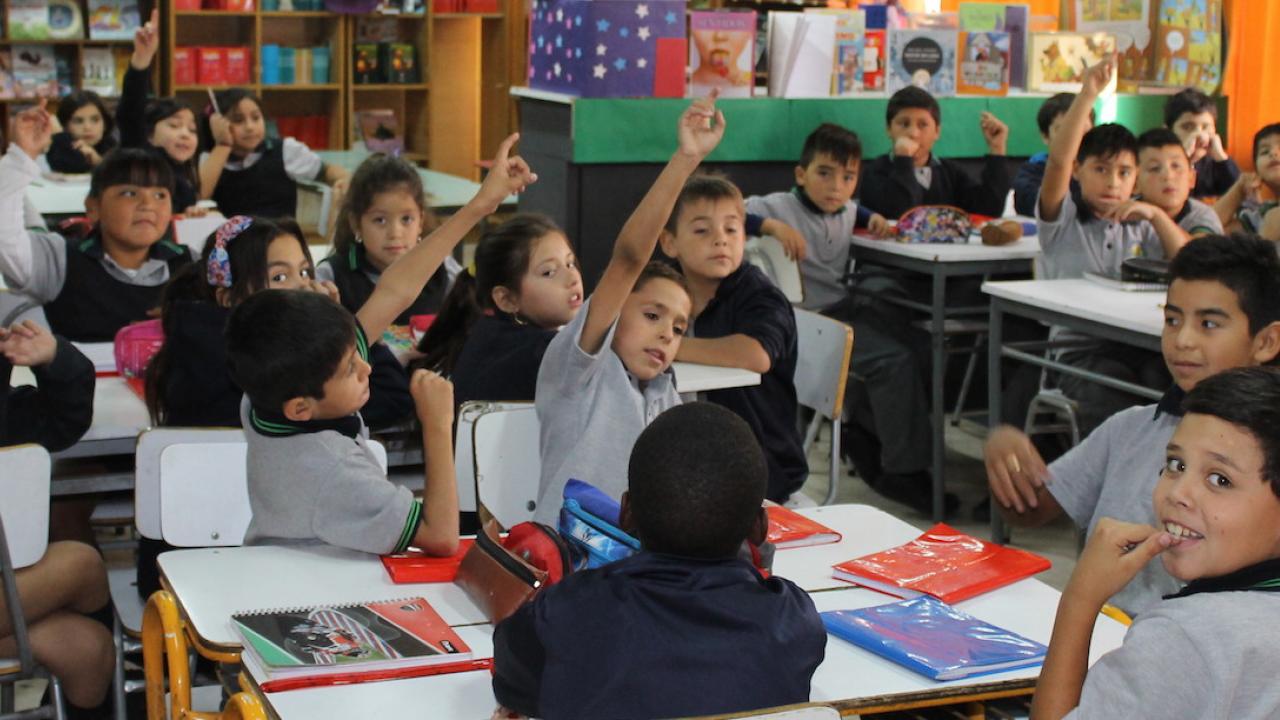
Zero Waste project seeks to eliminate micro trash dumps and construct a rain garden at an at-risk elementary school in Conchalí, Santiago Chile
Two invasive trash dumps surround Conchalí’s elementary school “Sol Naciente”. For years the municipality has tried to eradicate them, but the garbage that is removed from the sector soon returns. "We have an environment that is extremely damaged and it's hard for us to come study," says Sofía Vega, a 5th grade Sol Naciente student. Eventually, the director of the school, Amaranta Arenas, approached the University of California, Davis in Chile (UC Davis Chile) to see how they could help solve this problem. This is because UC Davis was chosen as the most sustainable university on the planet (Green Metric 2016).
Together with Camille Kirk, the Director of UC Davis Office of Sustainability, the solution was developed; to implement a Zero Waste curriculum in the school and start working on the root of the issue with the surrounding community. Parents, neighbor associations, and representatives of the Persian market who sets up a few meters from the school have already answered the call to action. In this way, the initiative promotes community awareness and ownership so that the elimination of open trash dumps is sustained in time.
In addition, the project includes the construction of a rain garden along the avenues Zapadores and General Gambino, which surround the school. When the rainy season begins, the avenue floods, adding a new danger to the school community. This garden will act as a bio-filter to deliver a manageable water flow to the sewer system.
This pilot project requires $15,000 USD which are being raised via donations on the Kickstarter website. The only thing that is needed is the desire to help ... and a credit card. It is very easy and fast!
If the project manages to collect the funds, it will be executed during 2018: Fundacion Basura-expert in Zero Waste curriculum- will work together with the community and the Municipality of Conchalí. The rain garden will be technically led by UC Davis Chile. The idea is for Sol Naciente to serve as a pilot to obtain public and private resources to scale the Zero Waste Conchalí movement to various schools in this municipality. Along with the installation of a Zero Waste curriculum, each school will have an installation according to their own problems, which could vary from a school garden to a green roof.
"Zero Waste projects have worked in Europe and the United States, why not in Chile? If we manage to raise the initiative in the Sol Naciente, this project is highly scalable, which will allow us to replicate it in other schools and municipalities in Chile. As UC Davis Chile Innovation center, we believe that science should be at the service of business challenges, as well as solve everyday and social problems", says doctor in hydrology Carlos Flores, Coordinator of Agronomy and Environment Programs at UC Davis Chile.
Kickstarter - one of the most famous crowd funding sites - works through an all or nothing system, so if we do not manage to raise at least US $ 15,000 the project will not receive any of the proceeds. We have until Sunday, April 29th!
If a company or institution wants to sponsor Zero Waste Conchalí, please contact zerowasteconchali@gmail.com.
What is Zero Waste?
The Zero Waste methodology emphasizes the redesign of the life cycle of resources, with the aim of reusing all products. We currently live in a linear economy, in which we take resources, and send waste to landfills and incinerators. Zero Waste aims to minimize what is considered waste, decreasing the incineration and burial of waste. Instead of discarding resources, it stipulates a system in which they are fully reintegrated into the product life cycle.
"More than eliminating waste through Recycle and Reuse, the focus is on restructuring the production and distribution of the system to reduce the generation of waste. Essentially, it replicates the way in which resources are used in nature”, explains Paulina Torres, the coordinator of Zero Waste Conchali. And she added: “With this project, we will work with the Municipality of Conchalí to coordinate and manage a waste management plan that emphasizes a change in the way waste flows through the municipality to continuously reduce the amount of waste generated”.
What does a rain garden consist of?
Rain gardens are areas with flowers and native vegetation that absorb rainwater. They are strategically located so that the runoff rainwater from impermeable urban areas has the opportunity to be absorbed. They act as buffer areas for floods and as bio filters, helping to eliminate contaminants that rainwater carries. Its creation also embellishes the environment, and recovers public spaces, such as the corner of Zapadores and General Gambino (Conchalí).
Twitter: @Conchali_ZW